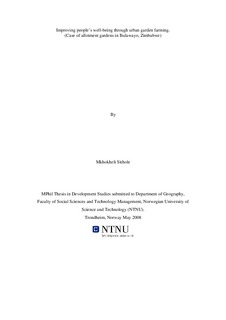| dc.contributor.author | Sithole, Mkhokheli | nb_NO |
| dc.date.accessioned | 2014-12-19T14:25:47Z | |
| dc.date.available | 2014-12-19T14:25:47Z | |
| dc.date.created | 2009-05-26 | nb_NO |
| dc.date.issued | 2009 | nb_NO |
| dc.identifier | 219180 | nb_NO |
| dc.identifier.uri | http://hdl.handle.net/11250/265303 | |
| dc.description.abstract | The study seeks to understand the importance and relevance of Urban Agriculture (UA) in the form of urban garden farming for vulnerable groups of people in the city of Bulawayo in Zimbabwe. The study is based on fieldwork which was carried out between June and August 2008 in Bulawayo. This was also the time of political uncertainty due to shameful presidential elections which were presided and followed by violence and intimidation of the civilians. The focus of the study is on how urban gardens contribute to livelihoods and well being of the beneficiaries.
The thesis employs the capability approach to address the research problem. The capability approach is modified and operationalised in a model that is relevant to this particular study. In the ensuing capability framework, gardens are treated as goods or services that enable beneficiaries to enjoy various capability sets.
The study reveals that urban gardens are important in providing livelihoods and improving well-beings in crumbling urban economies such as that of Bulawayo. Beneficiaries utilise the capability sets provided by gardens in an attempt to improve their well being. Capability sets which include food security, income generation, political participation and social capital related are also critically discussed exploring their relevance and significance in improving people’s lives.
One of the important issues in this study has been to acknowledge the diversity that exists amongst people. Even though the capability sets might be the same, they are explored differently by different people depending on external and internal factors affecting an individual. This makes the capability approach a powerful tool in that it enables a realistic understanding of people’s individual problems and potentials. In the Capability framework approach, various factors such as gender, physical condition, skill, education and institutions are discussed and their influence on what the beneficiaries can achieve from the gardens and the kind of life they want to choose to pursue thereafter is elaborated upon.
Beneficiaries from the same garden benefitted in a different way depending on how they used the capability sets. This thus tended to determine the kind of life they eventually could chose to live. It is thus important in development studies to pay particular attention to individual problems and abilities than to study people en masse. | nb_NO |
| dc.language | eng | nb_NO |
| dc.publisher | Norges teknisk-naturvitenskapelige universitet, Fakultet for samfunnsvitenskap og teknologiledelse, Geografisk institutt | nb_NO |
| dc.title | Improving people’s well-being through urban garden farming.(Case of allotment gardens in Bulawayo, Zimbabwe) | nb_NO |
| dc.type | Master thesis | nb_NO |
| dc.contributor.department | Norges teknisk-naturvitenskapelige universitet, Fakultet for samfunnsvitenskap og teknologiledelse, Geografisk institutt | nb_NO |
